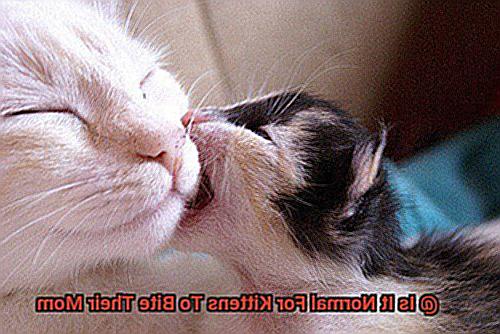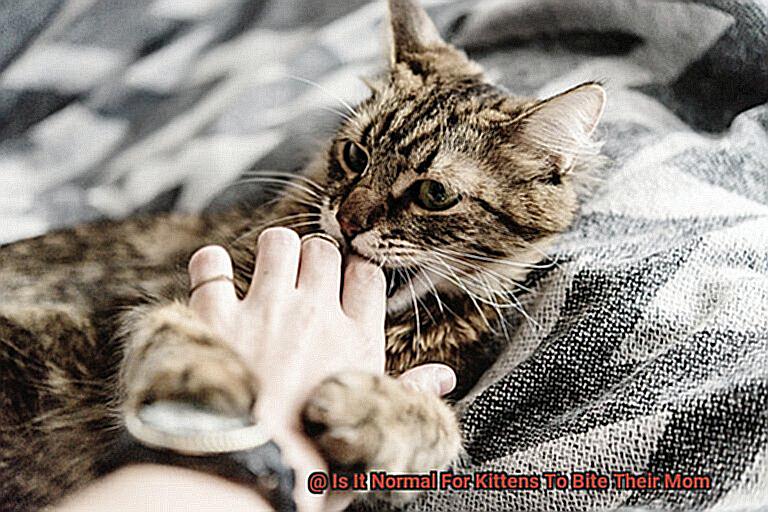The tiny balls of fluff that can make even the grumpiest of people crack a smile. But don’t let their innocent appearance fool you – these little furballs have a wild side too.
And when it comes to their relationship with their mother, things can get pretty interesting. So, let’s address the elephant in the room: do kittens commonly bite their mother?
Get ready for some paw-some insights into the world of kitten behavior.”
Is It Normal For Kittens To Bite Their Mom?
Contents
While it may seem concerning or even aggressive, this behavior is actually completely normal for kittens. As an expert on the topic, I am here to explain why kittens bite their moms and how cat owners can address this behavior in a healthy and effective manner.
Exploring and Learning
One of the main reasons why kittens bite their mothers is because they are still in the early stages of development and are learning how to interact with their environment. Just like human babies who put everything in their mouths, kittens use their teeth to explore and understand objects around them. This is a natural instinct for them and helps them learn important skills such as hunting and self-defense.
Play and Socialization
Kittens also bite as a form of play and socialization. This is an important part of their development as they learn how to communicate and bond with other cats. Biting allows them to practice their hunting skills in a safe and controlled environment. It also helps strengthen the bond between mother and kitten, as they engage in playful interactions.
Bonding with Mom
Biting is also seen as a way for kittens to bond with their mother. By gently nibbling on her, kittens can convey their needs such as hunger or discomfort. In return, the mother cat may also nibble her kittens as a way of grooming and showing affection. This behavior is essential for the development of a strong relationship between mother and kitten.
Excessive Biting: A Cause for Concern?
While it is normal for kittens to bite their mothers, excessive biting can be a sign of behavioral issues or lack of proper socialization. If the biting becomes too rough or aggressive, it can cause harm to the mother cat and her littermates. It is important for cat owners to monitor their kittens’ biting behavior and intervene if necessary.
Training and Socialization
As kittens grow and mature, their biting behavior should decrease. However, it is crucial for mother cats to teach their kittens proper socialization and boundaries when it comes to biting. This can be done through gentle reprimands and redirection to appropriate toys or objects.
Cat owners can also provide outlets for their kittens to satisfy their natural instincts to bite and play, such as scratching posts or interactive toys.
The Role of Biting in a Kitten’s Development
“The Importance of Biting in a Kitten’s Development: What Every Cat Owner Should Know”
As cat owners, we all love watching our kittens play and explore their surroundings. But when those tiny teeth start sinking into our skin, it can be a bit painful and concerning. However, before you start worrying about your kitten’s behavior, it’s important to understand that biting is a natural part of their development.
Biting may seem like a simple act of play, but it actually serves a crucial purpose in a kitten’s growth. Here’s why:
Developing Social Skills
Just like human babies, kittens learn through play. Biting is one way for them to communicate with their littermates and mother. Through play fighting and biting, they learn about boundaries and hierarchy within the litter. This helps them develop important social skills that will prepare them for adulthood.
Strengthening Physical Abilities
Biting also helps kittens develop their teeth and jaw muscles. As they grow older, they will need strong jaws to hunt and eat solid food. So while it may seem like your kitten is just nibbling on your fingers, they are actually building the strength they will need in the future.
Preparing for Adulthood
In the wild, mother cats teach their cubs how to hunt and defend themselves through play fighting and biting. This behavior is instinctual and serves as a way for kittens to practice their hunting and survival skills for adulthood.
Ensuring Proper Nutrition
It is also normal for kittens to bite their mother during nursing. This serves as a way for them to stimulate milk flow and ensure that they are getting enough nutrition. So if you see your kitten biting their mother during feeding time, don’t worry, it’s just their way of making sure they are well-fed.
Monitoring Excessive or Aggressive Biting
While biting is an essential part of a kitten’s development, it’s important for owners to monitor their behavior. If the biting becomes excessive or aggressive, it may be a sign of a problem that needs to be addressed. This could be due to pain or discomfort, or a lack of proper socialization.
Redirecting Teething Behavior
Just like human babies, kittens also go through a teething phase. This may cause them to bite on objects or people to relieve discomfort. Providing appropriate toys for them to chew on can help redirect this behavior and save your fingers from those sharp little teeth.
Communication Through Biting: What Does It Mean?
Kittens are known for their playful and curious nature, which often includes biting and nibbling on anything that catches their attention. While this behavior may seem like a nuisance to us as cat owners, it actually plays a crucial role in communication within a feline family. As an expert on the topic, I will delve into the world of kitten communication through biting and explain its significance in establishing boundaries, hierarchy, and affection within their family.
Establishing Boundaries:
Kittens biting their mothers is a natural behavior that is observed in almost all cat families. It serves as a way for the mother to teach her young about boundaries and appropriate behavior. Just like human parents use time-outs or stern words to discipline their children, mother cats use gentle bites to correct their kittens’ behavior. This helps them understand what is acceptable and what is not in their interactions with other cats and humans.
Hierarchy within the Litter:
Biting also plays a role in establishing hierarchy within the litter. As the kittens grow and develop, they begin to play with each other and explore their surroundings. Through play, they learn to communicate with each other through gentle bites, which helps them understand their place in the litter’s social hierarchy. This is an important skill that they will carry into adulthood when interacting with other cats.
Mother’s Role as Leader:
In addition to teaching boundaries and hierarchy, biting also helps the mother cat establish her role as the leader of the family. Just like in other animal species such as dogs and primates, mother cats use biting to communicate and discipline their young. This reinforces her authority and ensures that her kittens respect her as the head of the household.
Affection:
Contrary to popular belief, not all bites from kittens are disciplinary. Biting can also be a form of affection between a mother and her kittens. You may observe kittens gently nibbling on their mother’s fur as a way to show love and bond with her. This behavior is similar to how kittens knead their paws on soft surfaces, a leftover instinct from nursing.

When Biting Becomes Excessive: Identifying the Causes
As a cat owner, you may have experienced the joy and excitement of bringing home a new kitten. Their playful antics and curious nature can bring endless entertainment to our lives. However, sometimes these little balls of fur can also exhibit excessive biting behavior that can be concerning for pet owners. In this blog post, we will explore the potential causes and importance of observing behavior in identifying underlying issues when it comes to excessive biting in kittens.
Natural Behavior vs. Excessive Biting
First and foremost, it is essential to understand that biting is a natural behavior for kittens. It is how they explore and play with their surroundings. It is also a way for them to communicate with their mother and siblings. However, excessive biting can be a cause for concern and may indicate underlying issues.
Possible Causes of Excessive Biting
Lack of Socialization
One reason for excessive biting could be due to a lack of socialization during the kitten’s early development. Kittens who were not properly socialized with their mother and siblings may not have learned proper bite inhibition. This means they may not understand the appropriate level of force to use when playing or interacting with humans.
Teething Discomfort
Another possible cause is that the kitten is experiencing teething discomfort, which can lead to more biting behavior. Kittens usually start teething at around 3-4 months old, and this process can be painful and uncomfortable. As a result, they may resort to biting as a way to alleviate the discomfort.
Anxiety or Stress
Kittens may also resort to biting if they are feeling anxious or stressed. This can be triggered by changes in their environment, such as a new home or the presence of other pets. It is essential to provide a calm and safe space for your kitten to help them feel more at ease.
Aggression
In some cases, excessive biting may also be a sign of aggression towards their mother or other cats in the household. This behavior may also be seen in kittens who were weaned too early from their mother. It is crucial to observe your kitten’s body language and behavior to determine the root cause of their biting.
The Importance of Observing Behavior
How to Train Your Kitten to Stop Biting Their Mother
Kittens biting their mothers is a common behavior observed in the early stages of their life. However, excessive biting can be a sign of aggression or lack of socialization. As an expert on training kittens, I’m here to guide you through the steps of teaching your kitten to stop biting their mother.
Firstly, it’s important to understand why kittens bite their mothers. Kittens are naturally curious and playful, and biting is a normal part of their development. It is also a way for them to explore and learn about their surroundings. Additionally, kittens may bite their mothers when they are nursing as a way to stimulate milk flow. However, it is important to train them to stop this behavior for the safety of both the mother and her litter.
So how can you train your kitten to stop biting their mother? The key is redirection, positive reinforcement, and consistent discipline. When your kitten starts to bite their mother, offer them a toy or treat to redirect their attention to an appropriate object. This teaches them that biting is not acceptable but chewing on toys is. Remember to start training early on, ideally when the kitten is around 4-6 weeks old.
Positive reinforcement is also crucial in training your kitten. When they refrain from biting and play with the toy instead, reward them with praise or a treat. This reinforces good behavior and encourages them to continue it. Consistency is key in any training, so make sure all family members are on board with the same techniques and rules.
It’s also important to understand the stages of kitten development. Kittens go through different stages, and their biting behavior may vary depending on their age. For example, teething kittens may need appropriate chew toys to alleviate discomfort. Socialization with other kittens or cats can also help reduce biting behavior towards their mothers.
If your kitten’s biting behavior becomes too aggressive or persistent, it may be beneficial to seek professional help. A trainer or behaviorist can provide individualized advice and techniques to address your specific situation.
Different Reactions from Mother Cats: What You Need to Know
Don’t worry, there are various reasons and reactions that mother cats may have when their kittens start to bite them.
Let’s dive into the world of feline behavior and explore the different reactions that mother cats may have when their kittens start to bite.
Tolerance Levels
Just like humans, some mother cats may have a higher tolerance level than others. Some may simply move away from their kittens when they start to bite, while others may become more aggressive and hiss or swat at their kittens in response. This can also depend on the age of the kittens, as newborns are less likely to bite due to their underdeveloped motor skills.
Personality and Past Experiences
A mother cat’s reactions can also be influenced by her own personality and past experiences. A cat who was separated from her litter too early may not have learned proper socialization skills, leading to less tolerance for biting. On the other hand, a cat who has had previous litters may have developed a higher tolerance for rough play.
Breed Differences
It’s important to consider the breed of the mother cat as well. Some breeds are known for being more tolerant and gentle, while others may be more prone to aggression.
Encouraging Play
Believe it or not, some mother cats may actually encourage their kittens to bite them as part of playtime. This helps them develop important skills such as hunting and self-defense. However, it’s important for owners to monitor this behavior to ensure it doesn’t become too rough or aggressive.
Natural Development
Lastly, it’s important to remember that biting is a natural part of a kitten’s development. They learn to control their biting through play with their siblings and mother. However, if the biting becomes too rough or aggressive, it may be a sign of underlying issues that should be addressed.
Potential Risks and Dangers of Excessive Biting Between Mother and Kittens
Biting may be a common behavior among kittens during playtime, but when it becomes excessive, it can lead to potential risks and dangers for both the mother cat and her litter. As an expert on this topic, let me share with you some insights into the potential consequences of excessive biting between mother and kittens.
Injuries and Infections:
Kittens have sharp teeth, and their biting can cause scratches or wounds on their mother’s skin. If left untreated, these wounds can become infected, leading to further complications. The mother cat may also accidentally bite her kittens in self-defense, causing injuries that can also become infected.
Bonding and Behavioral Issues:
Excessive biting can disrupt the bonding process between the mother and her kittens. It may make the mother less affectionate towards her litter and cause her to reject or even abandon them. This can have serious consequences for the kittens’ well-being and survival. Moreover, if the mother is constantly in pain or discomfort from her kittens’ biting, it can affect her ability to properly care for her litter, leading to behavioral issues in the future.
Health Problems:
Biting can also be a sign of underlying health issues in kittens. For example, teething or malnutrition may cause them to bite excessively. It is essential to monitor your kittens’ biting behavior and consult with a veterinarian if you notice any changes or concerns.
Stress and Well-being:
Constant biting from kittens can be stressful for their mother, affecting her overall health and well-being. This stress may also manifest in aggressive behavior towards her kittens or other cats in the household.
Serious Injuries:
In rare cases, excessive biting from kittens can lead to serious injuries such as puncture wounds or broken bones. These injuries may require immediate medical attention to prevent further complications.
Conclusion
To sum up, it is perfectly normal for kittens to nibble and bite their mother.
This instinctual behavior serves a vital purpose in their development, allowing them to explore their surroundings, learn important skills, and bond with their mother. However, if the biting becomes excessive or aggressive, it may be a sign of underlying issues that require attention.
As responsible pet owners, it is our duty to closely observe our kittens’ behavior and intervene if necessary through proper training and socialization techniques. Seeking professional help may also be beneficial in addressing any behavioral concerns.
By understanding the reasons behind this behavior and taking appropriate measures, we can ensure the safety and well-being of both the mother cat and her litter.






